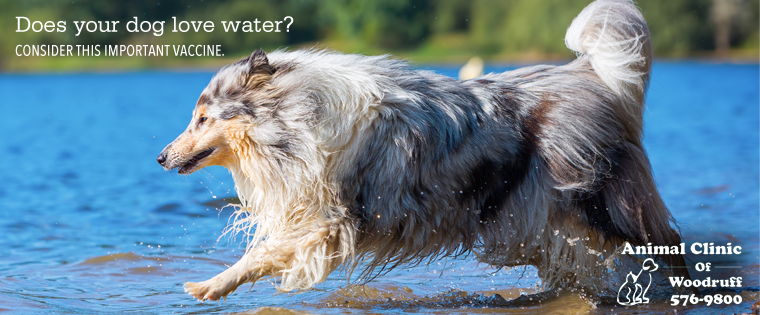As the temperatures warm up, many of us – including our dogs – are looking forward to waterfall hikes or days on the lake. For lots of our Animal Clinic of Woodruff families, summer with dogs includes plenty of water play and outdoor exploration. Unfortunately, these kind of adventures may increase the chances that your dog will contract leptospirosis, a bacterial infection that both dogs and humans (and rarely, cats) can acquire.
What is leptospirosis?
Leptospirosis is a disease caused by being infected with the Leptospira bacteria. These bacteria can be found anywhere in the world in soil or water, but most often exist in warm climates with heavy rainfall. In the U.S., the bacteria is most prevalent in late summer and early fall.
How are dogs exposed?
The most common place for a dog to contract Leptospira bacteria is in stagnant or slow-moving water, or along the banks of streams and rivers. Dogs are more at risk if they have cuts or scrapes and are exposed to infected water or the urine of animals that carry the bacteria.
Even though the disease is most common around still water, leptospirosis can affect any dog living in any type of environment: city or country, rural or urban. Dogs of all ages, breeds and sizes are at risk. The risk of exposure is greater in dogs that:
- Drink from lakes, rivers, or streams
- Wander freely on open land
- Interact with farm animals, wild animals or rodents
- Interact with other dogs
What are the symptoms of leptospirosis in dogs?
Unfortunately, the symptoms of leptospirosis in dogs are wide-ranging and unspecific. Some may not even show signs of illness, while others can develop severe, life-threatening reactions.
Signs of illness may include fever, shivering, stomach upset, lethargy / slow to move, difficulty breathing and inflammation. The disease can cause kidney failure, liver failure or lung disease. Leptospirosis can also cause bleeding disorders, which can be seen via blood in the urine or stool, nosebleeds, red spots, and swollen legs or excess fluid in the chest.
If you suspect any kind of illness in your dog, come into the Animal Clinic of Woodruff immediately.
Can humans get leptospirosis?
People can contract leptospirosis, either from exposure to contaminated water or from interaction with infected pets (though it is less common to get it from your pet). Symptoms are similar to the flu, but may also include kidney or liver symptoms. Tell your doctor if you’ve spent time around lakes or streams, or if your dog has had the infection.
How can I keep my dog safe?
The best way to keep your dog and family safe is to get a leptospirosis vaccination. Though rumors once spread that they were not safe, we assure you that they are safe, and we recommend and administer the shots here at the Clinic. If your dog will spend much of the summer roaming free and playing in water, we highly recommend the “Lepto Vaccination.” In fact, Dr. Merri and Dr. Zack’s dogs both receive the leptospirosis vaccine every year. One shot protects your dog for 12 months.
Additionally, to help protect your dog from illness:
- Provide plenty of clean, fresh water for your dog to dissuade him from drinking out of lakes and streams
- Keep your dog away from wild animals and farm animals when possible, especially their carcasses
- Keep your dog out of dirty, standing water, like small ponds
- Keep your dog away from other infected dogs and away from places where other dogs urinate regularly
If you’d like to get the vaccinate, have any questions or are concerned about your dog’s health, please schedule an appointment at Animal Clinic of Woodruff right away.













